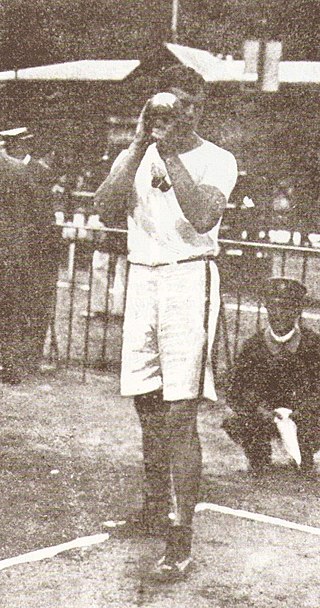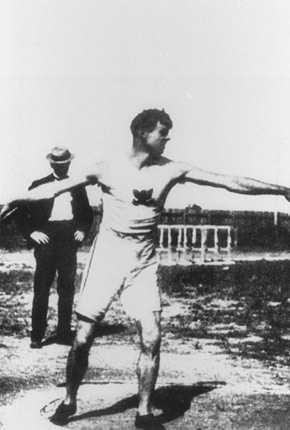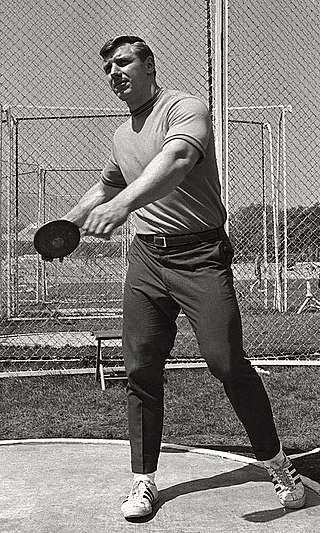
Robert S. Garrett was an American athlete, as well as investment banker and philanthropist in Baltimore, Maryland and financier of several important archeological excavations. Garrett was the first modern Olympic champion in discus throw as well as shot put.

At the 1900 Summer Olympics, twenty-three athletics events were contested. Altogether, 117 athletes from 15 nations competed. A total of 68 medals were awarded. In many countries, due in part to the conflation of the Olympic Games and the World's Fair in Paris, the media discussed only the athletics events under the "Olympic" name while ignoring the incredible variety of other sports featured at the time.

The men's discus throw competition at the 2004 Summer Olympics in Athens was held at the Olympic Stadium on 21–23 August. It was originally planned to hold the discus throw at the Ancient Olympia Stadium, but it was discovered that the field was not large enough to accommodate the range of modern discus throwers, and would have posed a danger to spectators. As such, it was decided to move the discus throw and to hold the shot put at the ancient stadium, despite the fact that the shot put was not contested at the Ancient Olympic Games. Thirty-nine athletes from 26 nations competed.

Panagiotis Paraskevopoulos was a Greek athlete. He competed at the 1896 Summer Olympics in Athens, and the 1900 Summer Olympics held in Paris. He was born in Gortynia and died in Corfu.

The men's 1500 metres was a middle-distance running event on the athletics programme at the 1900 Summer Olympics in Paris. It was held on July 15, 1900. The race was held on a track of 500 metres in circumference. Nine athletes from six nations competed. The event was won by Charles Bennett of Great Britain, the nation's first medal in the brief history of the event.

The men's shot put was a track & field athletics event at the 1900 Summer Olympics in Paris. It was held on July 14 and July 15, 1900. 11 shot putters from five nations competed. The event was won by Richard Sheldon of the United States, the nation's second consecutive victory in the men's shot put. Josiah McCracken took silver and Robert Garrett took bronze, completing an American medal sweep.

The men's discus throw was one of two throwing events on the Athletics at the 1896 Summer Olympics programme. The discus throw was the fourth event held. It was contested on 6 April. 9 athletes competed, including one each from France, Sweden, the United States, and Great Britain as well as three Greeks and two Danes.

The men's discus throw was one of six throwing events on the Athletics at the 1908 Summer Olympics programme in London. The competition was held on 16 July 1908. 42 throwers from eleven nations competed. NOCs could enter up to 12 athletes. The event was won by Martin Sheridan of the United States, his second consecutive victory in the event. The Americans completed their first sweep in the discus throw, with Merritt Giffin taking silver and Bill Horr bronze.

The men's shot put was one of six throwing events on the Athletics at the 1908 Summer Olympics programme in London. The competition was held on July 16, 1908. 25 shot putters from eight nations competed. NOCs could enter up to 12 athletes. The event was won by Ralph Rose, successfully defending his title from 1904 and making it four consecutive Games that the event was won by an American. The two-Games streak of sweeps in 1900 and 1904 ended, however, as Denis Horgan of Great Britain took silver. Johnny Garrels of the United States took bronze. Rose was the second man to win two medals in the shot put ; Wesley Coe nearly was the third as he ended up in 4th place, only 11 centimetres behind Garrels.
The men's discus throw event at the 2000 Summer Olympics as part of the athletics program was held at the Olympic Stadium on Sunday, 24 September and Monday, 25 September. Forty-five athletes from 28 nations competed. The event was won by Virgilijus Alekna of Lithuania, the nation's second victory in the men's discus throw. Lars Riedel of Germany took silver, becoming the 13th man to win multiple discus throw medals. Frantz Kruger earned South Africa's first medal in the event with his bronze.

The men's discus throw was a track and field athletics event held as part of the Athletics at the 1904 Summer Olympics programme. It was the third time the event was held. The competition was held on Saturday, September 3, 1904. Six athletes from two nations competed.

The men's shot put was a track and field athletics event held as part of the athletics at the 1912 Summer Olympics programme. The competition was held on Wednesday, July 10, 1912. Twenty-two shot putters from 14 nations competed. NOCs could enter up to 12 athletes. The event was won by Pat McDonald of the United States, the nation's fifth consecutive victory in the men's shot put. The American team swept the top three places, the third time in five Games. Ralph Rose took silver, 9 centimetres shy of a third gold medal; he became the first man to win three medals of any color.

The men's discus throw was a track and field athletics event held as part of the athletics at the 1912 Summer Olympics programme. The competition was held on Friday, July 12, 1912. Forty-one discus throwers from 15 nation competed. NOCs could enter up to 12 athletes. The event was won by Armas Taipale of Finland, the nation's first medal in the men's discus throw. Richard Byrd took silver and James Duncan took bronze to continue the United States' podium streak at five consecutive Games.

The men's discus throw event was part of the track and field athletics programme at the 1936 Summer Olympics. The competition was held on August 5, 1936. Thirty-one athletes from 17 nations competed. The maximum number of athletes per nation had been set at 3 since the 1930 Olympic Congress. The final was won by Ken Carpenter of the United States. It was the nation's fourth consecutive, and seventh overall, victory in the men's discus throw; it was also the second consecutive Games that the Americans finished with both of the top two places, as Gordon Dunn took silver. Giorgio Oberweger earned Italy's first men's discus throw medal with his bronze.

The men's discus throw event was part of the track and field athletics programme at the 1948 Summer Olympics. Twenty-eight athletes from 18 nations competed. The maximum number of athletes per nation had been set at 3 since the 1930 Olympic Congress. The competition was held on August 2. The final was won by Adolfo Consolini of Italy. It was the nation's first victory in the men's discus throw; Italy had previously taken bronze in 1936. Giuseppe Tosi earned silver to put Italy in the top two places. Fortune Gordien of the United States won bronze, keeping the Americans on the podium in each appearance of the men's discus throw to date.

The men's discus throw throwing event at the 1960 Summer Olympics took place on September 6 & September 7. Thirty-five athletes from 22 nations competed. The maximum number of athletes per nation had been set at 3 since the 1930 Olympic Congress. The event was won by Al Oerter of the United States, the nation's third consecutive and 10th overall victory in the men's discus throw. It was Oerter's second gold medal in the event; he would go on to win four. Oerter was the sixth man to win two medals in the event, and the third to win two gold medals. The United States earned its second consecutive and third overall medal sweep in the event, as Rink Babka took silver and Dick Cochran bronze.

The men's discus throw field event at the 1972 Olympic Games took place on September 1 and 2. Twenty-nine athletes from 18 nations competed. The maximum number of athletes per nation had been set at 3 since the 1930 Olympic Congress. After the retirement of four-time Olympic champion Al Oerter, this was an event that was open to everyone. The favorite was two-time Olympic medalist and 1971 European Champion Ludvík Daněk. Daněk won, completing a full set of three different medals in the event; it was Czechoslovakia's first gold medal in the men's discus throw. Daněk was the second man to win three medals in the event. Jay Silvester of the United States took silver, keeping alive the American streak of medaling in every appearance of the event. Ricky Bruch earned Sweden's first medal in the men's discus throw with his bronze.
The men's discus throw event at the 1952 Summer Olympics took place on 22 July at the Helsinki Olympic Stadium. Thirty-two athletes from 20 nations competed. The maximum number of athletes per nation had been set at 3 since the 1930 Olympic Congress. The event was won by Sim Iness of the United States, the nation's eighth victory in the men's discus throw. Defending champion Adolfo Consolini of Italy took silver, becoming the fourth man to win two medals in the event. American James Dillion won bronze.

The men's discus throw competition at the 1968 Summer Olympics in Mexico City, Mexico took place on October 14–15. Twenty-seven athletes from 19 nations competed. The maximum number of athletes per nation had been set at 3 since the 1930 Olympic Congress. The event was won by Al Oerter of the United States, the nation's fifth consecutive and 12th overall victory in the men's discus throw. Oerter finished his run of four victories in the event, the first person to win four consecutive gold medals in any individual Olympic event. For the first time during Oerter's reign, he was the only American on the podium as Lothar Milde of East Germany and Ludvík Daněk of Czechoslovakia took the other two medals. Daněk was the seventh man to win at least two discus throw medals; Oerter remains the only one to win four.

The men's discus throw event at the 2020 Summer Olympics took place between 30 and 31 July 2021 at the Japan National Stadium. Approximately 35 athletes were expected to compete; the exact number depended on how many nations use universality places to enter athletes in addition to the 32 qualifying through distance or ranking. 32 athletes from 24 nations competed. Daniel Ståhl of Sweden won gold, with his countryman Simon Pettersson earning silver. It was the first victory in the event for Sweden and the first men's discus throw medal of any color for the nation since 1972. Lukas Weißhaidinger took Austria's first-ever Olympic in the men's discus with his bronze.

















